Best OTC Dewormers for Cats
Contents of Article
- Worms are common internal parasites for cats.
- What is the Best OTC Dewormer for Cats?
- The Most Common Types of Worms
- What type of worms does your cat have?
- Types of Dewormers
- What makes a dewormer a good choice?
- Top 5 Best Dewormers for Cats
- What’s better than a great dewormer? Preventing worm infestations before they take hold.
Worms are common internal parasites for cats.
Worms are a particularly regular concern for cats who spend a lot of time outdoors, eat live prey, have fleas, or are exposed to cats who carry worms. When we refer to “worms”, we’re typically talking about intestinal parasites. In the USA, the most common intestinal worms in cats are roundworms, hookworms, and tapeworms. Depending on which type of worms your cat is dealing with, an infestation could cause a variety of symptoms and health outcomes.
Left untreated, worm infestations could lead to serious consequences: severe infestations may lead to gastrointestinal disturbances, anemia, and unhealthy skin and coat.
Fortunately, worms are easy to treat once you’ve chosen the right dewormer. Your veterinarian may prescribe a dewormer for more serious infestations, while mild infestations can be easily treated with an over-the-counter medication. While it is recommended that you go to the veterinarian to determine exactly what type of worms your cat is dealing with and what medication they should use, this article aims to help you sift through the world of OTC dewormers to find one that works for your cat.
After going into a little more detail on intestinal worms and their treatment, we’ll share our handy list of the top 5 best dewormers for your cat.
What is the Best OTC Dewormer for Cats?
The Most Common Types of Worms
The following three intestinal worm types affect cats in the United States.
Roundworms
These long worms are passed through the feces of an infested animal and can survive for years. Your cat can become infested by ingesting the eggs directly or by consuming an infested animal. For kittens, roundworm infestations can come straight from their mother, which is why it’s recommended that you assume all kittens are infested. In this case, dormant larvae from previous infestations pass through the mother’s milk and enter the kitten’s body. And your cat isn’t the only one who can be affected by roundworms – these worms can be transmitted to humans, too.
Symptoms of Roundworms in Cats
Cats with roundworms exhibit symptoms including vomiting, diarrhea, and a generally sick appearance. Afflicted kittens will often be potbellied and overly hungry.
Tapeworms
These intestinal parasites are named for their tape-shaped bodies: they’re long, flat worms ranging from 4 to 28” in length. These worms are segmented, and each segment, or proglottid, is full of eggs. Each of these segments resembles a grain of white rice, though the size and shape can vary. Because cats infested with tapeworms will often show no symptoms, these worm segments are usually the first way that you’ll realize your cat is host to tapeworms – they’ll often appear on the fur under your cat’s tail or in the litter box.
Cats get tapeworms when they consume secondary hosts – animals who’ve consumed tapeworm eggs. Fleas are a particularly common source of tapeworms, while birds, rabbits, and rodents also pose a risk.
Symptoms of Tapeworms in Cats
While many cats with tapeworms show no symptoms, an infestation could be linked to vomiting in some cats. As the infestation progresses and the worms leech nutrients from your cat’s body, tapeworms can lead to weight loss and a rough or patchy coat.
Hookworms
Considerably smaller than roundworms and tapeworms at less than an inch long, these worms attach to the lining of your cat’s intestinal wall and feed off of their blood. Because these parasites feed off of your cat’s blood, an infestation can quickly lead to anemia and death – a particularly serious concern for kittens. Your cat can get hookworms from ingesting an infested animal, eating the worms’ eggs directly, or when the larvae burrow into their skin.
Symptoms of Hookworms in Cats
An early symptom of hookworms is lesions on your cat’s paws where the worms burrowed through their skin. Infested cats may eventually develop dark, tar-like stool, diarrhea, and constipation. Hookworms lead to anemia, which causes paleness, lethargy, weight loss, and loss of appetite.
What type of worms does your cat have?
It can be difficult to pin down exactly what type of worms your cat has on your own. While some medications treat all of the above types of worms, others only use one drug to treat a single type of worm. Broad spectrum medications may be more convenient, but they come with a higher risk of side effects. It’s recommended that you consult a veterinarian to identify the type of worms your cat’s afflicted with and receive advice on the best medication to use.
Types of Dewormers
Chemical Dewormers
Depending on the type of dewormer you choose, these medications work in a variety of ways to rid your cat of worms, sometimes killing the worms and other times just encouraging them to pass out of your cat’s body. We’ll go over some of the most common active ingredients in cat dewormers and how they work.
Praziquantel
This ingredient is used to eliminate tapeworms. It inhibits the tapeworms’ ability to prevent your cat from digesting nutrients, in essence starving the tapeworms and causing them to disintegrate. After praziquantel treatment, the tapeworms are absorbed by the cat’s body. Side effects are rare, but some cats have experienced salivation or diarrhea after taking this drug.
Pyrantel pamoate
Effective in treating roundworms and hookworms, this ingredient works by paralyzing the worms’ bodies. Since roundworms and hookworms survive by latching onto the intestinal wall, this paralysis causes them to lose their grip and pass through your cat’s body and out in their stool. Many liquid forms of this drug actually taste good to cats, making it easier to administer. Pyrantel pamoate is a safe drug with minimal side effects – vomiting may occur, but this reaction is rare.
Piperazine
This drug works the same way that pyrantel pamoate does: by paralyzing roundworms. The worms then pass through the body, still alive but detached from the host organism. Side effects are rare, but in the case of an overdose, your cat may experience nausea, vomiting, and muscle tremors.
Natural Alternatives
Diatomaceous earth is frequently recommended as a natural dewormer for cats. This fine natural powder is effective as a safe, organic pesticide in other applications. It’s regularly used as an organic agricultural pesticide and is also effective on parasites like fleas. Theoretically, diatomaceous earth works internally the same way that it does externally: by dehydrating the parasites.
However, there’s little evidence that it is an effective treatment for internal parasites. While few peer-reviewed scientific studies have been done on the effect of DE for internal parasites, those few studies that have been performed have shown that diatomaceous earth doesn’t eliminate or even reduce concentrations of internal parasites in animals of any species.
And common sense backs these studies up. While diatomaceous earth effectively absorbs water from insect bodies in a dry environment, in the wet intestinal landscape, this earth has little ability to draw water from a worm’s body.
As for other natural dewormers, there are a few products on the market that feature combinations of herbs and other ingredients that claim to effectively rid cats of worms. Common ingredients are blends of wormwood, black walnut, and clove, which purportedly create a hostile environment for parasites.
Another natural dewormer is cucurbitin, an amino acid found in pumpkin seeds, which can paralyze parasites and encourage them to pass through your cat’s body.
In theory, these make a nice alternative for those who don’t want to give their cat drugs. But do they really work every time? Frankly, I’ve been unable to find natural dewormers that have the same consistent record of success that the best chemical dewormers offer. Natural dewormers probably won’t hurt your cat, but if you’re really looking to get rid of the problem, conventional dewormers are your best bet.
What makes a dewormer a good choice?
In choosing the best worming treatment for your cat, there are a few issues that decide which is the right fit for your pet. Our list of the top 5 best dewormers features products chosen based on the following important issues:
Safety
Obviously, the most important thing to consider when choosing a dewormer is safety. Whether you’re using a broad spectrum dewormer or one specific to the type of worms that your cat has, it’s important that the dewormer won’t cause harmful side effects or allergic reactions. All of the products on the following list have a reputation for safety, but there’s no guarantee that they will be right for your cat. Make sure that your cat is getting the right medication by consulting your veterinarian and getting any necessary testing done. Dewormers are not recommended for cats who are otherwise sick or debilitated, so again, it’s important to check with a professional who can take your cat’s unique situation into consideration.
Palatability and Convenience
Dewormers are available either topical or oral forms. Oral medications come in tablet, liquid, and paste form. All of these varieties work well, but which is the right choice for your cat depends on their individual taste. Besides palatability and cat-friendliness, another major consideration is price. Dewormers are available at a variety of different price points, so it’s possible to choose one that suits your budget and needs at once.
Effectiveness
Of course, the right dewormer is one that gets rid of the worms that are plaguing your cat. All of the choices on our list of the top five best dewormers for cats are time-tested products that effectively clear out worm infestations in cats.
Top 5 Best Dewormers for Cats
Bayer Tapeworm Cat De-Wormer
For tapeworm infestations. The active ingredient is praziquantel.
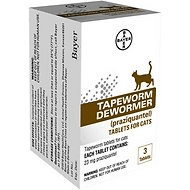
Each of these tablets contains 23mg praziquantel, which effectively kills tapeworms. These tablets are easily crushed into food or fed whole. Besides removing tapeworms, this treatment is safe for cat’s who don’t have tapeworms, so you don’t have to worry about misdiagnosis. These tablets are affordable and well-reviewed among customers. – Buy It
Pros
- Effectively removes tapeworms
- Safe for cats, side effects are minimal and rare
- Safe to take with food
Cons
- Salivation and diarrhea are occasional side effects
Bayer Drontal Broad Spectrum Dewormer
A broad spectrum dewormer for tapeworms, roundworms, and hookworms. The active ingredients are praziquantel and pyrantel pamoate.
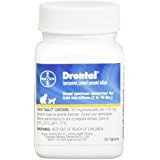
Drontal is a broad spectrum dewormer often used by veterinarians. These tablets use two drugs to attack all three of the most common intestinal worms that affect cats. Each tablet contains 18.2mg praziquantel and 72.6mg pyrantel base as pyrantel pamoate. Although the tablets are large and unpleasant tasting, they’re easily scored into quarters for proper dosing and easier administering. This is a trusted product with an excellent reputation for safety and effectiveness. – Buy It
Pros
- Safe and reliable – side effects are minimal and rare
- An effective broad spectrum treatment
- Used by veterinarians
Cons
- Some may prefer to use a worm-specific treatment rather than broad spectrum
- The tablets are unpleasant-tasting and giving them to your cat may take some work
Pro-Sense Liquid Cat Dewormer
For roundworms. The active ingredient is piperazine.
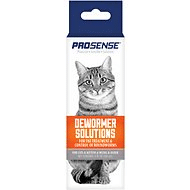
With an appealing flavor, this easy-to-administer liquid is a no-fuss way to treat cats with roundworms. Each teaspoon contains 250mg piperazine, which paralyzes roundworms so that they’ll pass out of your cat’s body. It’s important to make sure that you give your cat the correct dosage, as nausea, vomiting, and muscle tremors may occur in the case of an overdose. – Buy It
Pros
- Easy-to-feed liquid makes administering this dewormer simple
- Effectively eliminates roundworms
- A safe product; side effects are rare
Cons
- Overdosing this product could cause nausea, vomiting, and muscle tremors
- Contains caramel color, which is an unwanted ingredient for some
PetArmor Worm-Away Caps
For roundworms. The active ingredient is piperazine.
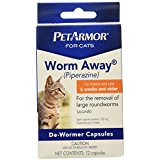
This highly-affordable roundworm treatment comes in convenient caps that make it easy to dose and administer by breaking open the capsules and adding the medication to your cat’s food. This dewormer uses piperazine to effectively paralyze and expel roundworms. – Buy It
Pros
- Capsules make correct dosing simple
- Effectively removes roundworms
- A safe product; side effects are rare
Cons
- Overdosing this product could cause nausea, vomiting, and muscle tremors
Naturpet D Wormer
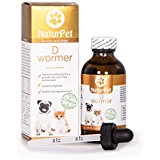
For tapeworms and roundworms, plus other parasites. Made from a blend of wormwood, black walnut, black seed, fennel seed, sage leaf, and papaya leaf.
For those seeking a natural dewormer, this product offers a combination of traditional herbs that have been used historically for antifungal purposes, to expel parasites, and in healing the digestive tract. It includes a dropper to make it easy to incorporate the correct dose into your cat’s food. – Buy It
Pros
- All-natural and chemical free
- Helps to rid the body of tapeworms and roundworms
- Encourages digestive health and soothes the digestive tract
Cons
- Reviews are mixed: this treatment is not consistently effective, although some love it
What’s better than a great dewormer? Preventing worm infestations before they take hold.
The best approach to worm treatment is to prevent an infestation before it happens. Here are some tips for worm prevention:
Don’t let your cat eat wild animals.
Rodents, birds, and rabbits are some of the most common carriers of worms. When your cat eats one of these animals, they’re at risk of also ingesting worms and their larvae. Cats who eat their prey or scavenge on dead animals are at an increased risk of developing a worm infestation. To keep your cat from eating these animals, you can keep them indoors or supervise their outdoor activities.
Eliminate fleas.
Fleas are a common carrier of tapeworm larvae. When your cat has a flea problem, they’ll end up ingesting some of those fleas and, consequently, any worms that those fleas are carrying. To avoid repeated infestations, it’s important to keep your cat free of fleas.
Keep your cat’s surroundings clean.
In an unclean environment where healthy cats come into contact with worm-infested cats, there’s a high risk of parasitic infestation and reinfestation. Keeping your cat’s surroundings clean is a key part of worm prevention. Make sure that litter boxes, bedding, toys, food dishes, and any soiled objects are promptly cleaned and maintained.













